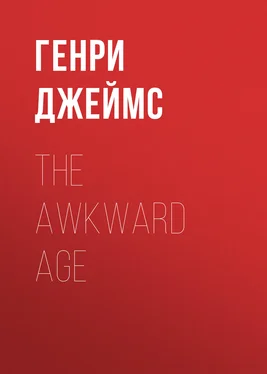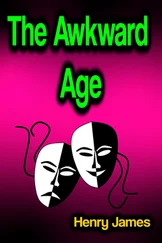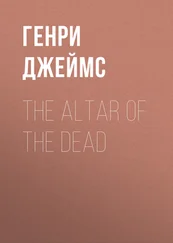Генри Джеймс - The Awkward Age
Здесь есть возможность читать онлайн «Генри Джеймс - The Awkward Age» — ознакомительный отрывок электронной книги совершенно бесплатно, а после прочтения отрывка купить полную версию. В некоторых случаях можно слушать аудио, скачать через торрент в формате fb2 и присутствует краткое содержание. Жанр: foreign_prose, foreign_antique, на английском языке. Описание произведения, (предисловие) а так же отзывы посетителей доступны на портале библиотеки ЛибКат.
- Название:The Awkward Age
- Автор:
- Жанр:
- Год:неизвестен
- ISBN:нет данных
- Рейтинг книги:5 / 5. Голосов: 1
-
Избранное:Добавить в избранное
- Отзывы:
-
Ваша оценка:
- 100
- 1
- 2
- 3
- 4
- 5
The Awkward Age: краткое содержание, описание и аннотация
Предлагаем к чтению аннотацию, описание, краткое содержание или предисловие (зависит от того, что написал сам автор книги «The Awkward Age»). Если вы не нашли необходимую информацию о книге — напишите в комментариях, мы постараемся отыскать её.
The Awkward Age — читать онлайн ознакомительный отрывок
Ниже представлен текст книги, разбитый по страницам. Система сохранения места последней прочитанной страницы, позволяет с удобством читать онлайн бесплатно книгу «The Awkward Age», без необходимости каждый раз заново искать на чём Вы остановились. Поставьте закладку, и сможете в любой момент перейти на страницу, на которой закончили чтение.
Интервал:
Закладка:
The subject of this address, with one of the photographs in his hand, glanced, while he reflected, at the other. Then with a subtlety that matched itself for the moment with Vanderbank’s: “You just told me yourself that the little foreign person—”
“Is ever so much the lovelier of the two? So I did. But you’ve promptly recognised it. It’s the first time,” Vanderbank went on, to let him down more gently, “that I’ve heard Mrs. Brookenham admit the girl’s good looks.”
“Her own girl’s? ‘Admit’ them?”
“I mean grant them to be even as good as they are. I myself, I must tell you, extremely like Nanda’s appearance. I think Lady Julia’s granddaughter has in her face, in spite of everything—!”
“What do you mean by everything?” Mr. Longdon broke in with such an approach to resentment that his host’s gaiety overflowed.
“You’ll see—when you do see. She has no features. No, not one,” Vanderbank inexorably pursued; “unless indeed you put it that she has two or three too many. What I was going to say was that she has in her expression all that’s charming in her nature. But beauty, in London”—and feeling that he held his visitor’s attention he gave himself the pleasure of freely presenting his idea—“staring glaring obvious knock-down beauty, as plain as a poster on a wall, an advertisement of soap or whiskey, something that speaks to the crowd and crosses the footlights, fetches such a price in the market that the absence of it, for a woman with a girl to marry, inspires endless terrors and constitutes for the wretched pair (to speak of mother and daughter alone) a sort of social bankruptcy. London doesn’t love the latent or the lurking, has neither time nor taste nor sense for anything less discernible than the red flag in front of the steam-roller. It wants cash over the counter and letters ten feet high. Therefore you see it’s all as yet rather a dark question for poor Nanda—a question that in a way quite occupies the foreground of her mother’s earnest little life. How WILL she look, what will be thought of her and what will she be able to do for herself? She’s at the age when the whole thing—speaking of her ‘attractions,’ her possible share of good looks—is still to a degree in a fog. But everything depends on it.”
Mr. Longdon had by this time come back to him. “Excuse my asking it again—for you take such jumps: what, once more, do you mean by everything?”
“Why naturally her marrying. Above all her marrying early.”
Mr. Longdon stood before the sofa. “What do you mean by early?”
“Well, we do doubtless get up later than at Beccles; but that gives us, you see, shorter days. I mean in a couple of seasons. Soon enough,” Vanderbank developed, “to limit the strain—!” He was moved to higher gaiety by his friend’s expression.
“What do you mean by the strain?”
“Well, the complication of her being there.”
“Being where?”
“You do put one through!” Vanderbank laughed. But he showed himself perfectly prepared. “Out of the school-room and where she is now. In her mother’s drawing-room. At her mother’s fireside.”
Mr. Longdon stared. “But where else should she be?”
“At her husband’s, don’t you see?”
He looked as if he quite saw, yet was nevertheless not to be put off from his original challenge. “Ah certainly; but not as if she had been pushed down the chimney. All in good time.”
“What do you call good time?”
“Why time to make herself loved.”
Vanderbank wondered. “By the men who come to the house?”
Mr. Longdon slightly attenuated this way of putting it. “Yes—and in the home circle. Where’s the ‘strain’ of her being suffered to be a member of it?”
III
Vanderbank at this left his corner of the sofa and, with his hands in his pockets and a manner so amused that it might have passed for excited, took several paces about the room while his interlocutor, watching him, waited for his response. That gentleman, as this response for a minute hung fire, took his turn at sitting down, and then Vanderbank stopped before him with a face in which something had been still more brightly kindled. “You ask me more things than I can tell you. You ask me more than I think you suspect. You must come and see me again—you must let me come and see you. You raise the most interesting questions and we must sooner or later have them all out.”
Mr. Longdon looked happy in such a prospect, but once more took out his watch. “It wants five minutes to midnight. Which means that I must go now.”
“Not in the least. There are satisfactions you too must give.” His host, with an irresistible hand, confirmed him in his position and pressed upon him another cigarette. His resistance rang hollow—it was clearly, he judged, such an occasion for sacrifices. Vanderbank’s view of it meanwhile was quite as marked. “You see there’s ever so much more you must in common kindness tell me.”
Mr. Longdon sat there like a shy singer invited to strike up. “I told you everything at Mrs. Brookenham’s. It comes over me now how I dropped on you.”
“What you told me,” Vanderbank returned, “was excellent so far as it went; but it was only after all that, having caught my name, you had asked of our friend if I belonged to people you had known years before, and then, from what she had said, had—with what you were so good as to call great pleasure—made out that I did. You came round to me on this, after dinner, and gave me a pleasure still greater. But that only takes us part of the way.” Mr. Longdon said nothing, but there was something appreciative in his conscious lapses; they were a tribute to his young friend’s frequent felicity. This personage indeed appeared more and more to take them for that—which was not without its effect on his spirits. At last, with a flight of some freedom, he brought their pause to a close. “You loved Lady Julia.” Then as the attitude of his guest, who serenely met his eyes, was practically a contribution to the subject, he went on with a feeling that he had positively pleased. “You lost her—and you’re unmarried.”
Mr. Longdon’s smile was beautiful—it supplied so many meanings that when presently he spoke he seemed already to have told half his story. “Well, my life took a form. It had to, or I don’t know what would have become of me, and several things that all happened at once helped me out. My father died—I came into the little place in Suffolk. My sister, my only one, who had married and was older than I, lost within a year or two both her husband and her little boy. I offered her, in the country, a home, for her trouble was greater than any trouble of mine. She came, she stayed; it went on and on and we lived there together. We were sorry for each other and it somehow suited us. But she died two years ago.”
Vanderbank took all this in, only wishing to show—wishing by this time quite tenderly—that he even read into it deeply enough all the unsaid. He filled out another of his friend’s gaps. “And here you are.” Then he invited Mr. Longdon himself to make the stride. “Well, you’ll be a great success.”
“What do you mean by that?”
“Why, that we shall be so infatuated with you that we shall make your life a burden to you. You’ll see soon enough what I mean by it.”
“Possibly,” the old man said; “to understand you I shall have to. You speak of something that as yet—with my race practically run—I know nothing about. I was no success as a young man. I mean of the sort that would have made most difference. People wouldn’t look at me—”
“Well, WE shall look at you,” Vanderbank declared. Then he added: “What people do you mean?” And before his friend could reply: “Lady Julia?”
Читать дальшеИнтервал:
Закладка:
Похожие книги на «The Awkward Age»
Представляем Вашему вниманию похожие книги на «The Awkward Age» списком для выбора. Мы отобрали схожую по названию и смыслу литературу в надежде предоставить читателям больше вариантов отыскать новые, интересные, ещё непрочитанные произведения.
Обсуждение, отзывы о книге «The Awkward Age» и просто собственные мнения читателей. Оставьте ваши комментарии, напишите, что Вы думаете о произведении, его смысле или главных героях. Укажите что конкретно понравилось, а что нет, и почему Вы так считаете.












